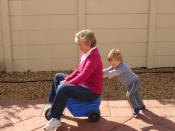There have been many studies on kinship terms. In 1928, Piaget looked at children's definitions of the terms 'brother' and 'sister'. Danziger (1957) and Elkind (1962) replicated the study and also looked at three additional terms: 'daughter', 'uncle' and 'cousin'.
However, it was not until 1974, that Haviland and Clark asked children, between the ages of 3 and 8, to define 15 kinship terms. These were: mother, father, son, daughter, brother, sister, grandmother, grandfather, grandson, granddaughter, uncle, aunt, niece, nephew and cousin.
What concerned Haviland and Clark was whether the differences in semantic complexity can be used to predict the order of acquisition of the kinship terms. For example, mother is less semantically complex than cousin. Therefore, according to Haviland and Clark, mother would be acquired prior to cousin regardless of whether the children had experienced the particular relationship.
We carried out our fieldwork at San Anton School. We spoke to 20 random students from four different grades: five from pre-grade, five from Grade 2, five from Grade 3 and five from Grade 4.
These children all spoke English fluently. Basically, they did not have any problems understanding the questions. Nevertheless, it is evident that some of these random children were conscious of the camera and perhaps even shy of us, as they had never met us before.
The Stages according to Haviland and Clark
In the first stage, the child has no component features and gives an extremely basic definition.
For example: "What is a brother?"
" A brother is a boy" (3 years old)
The child may even pick up on some completely irrelevant factor such as the person's name or the job that they do. We also considered Maltese translations to fall under Stage 1 (for example: "What is a grandmother?" "A nanna")
In the second...


![Champ Clark at Sea Gert [i.e., Girt] (LOC)](https://s.writework.com/uploads/11/119189/champ-clark-sea-gert-e-girt-loc-thumb.jpg)